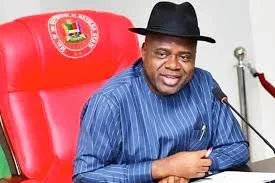Bayelsa State Governor Douye Diri has officially defected from the Peoples Democratic Party (PDP) to the ruling All Progressives Congress (APC). The high-profile switch, celebrated at a packed rally in Yenagoa, marks a major blow to the opposition and realigns the oil-rich state with the federal government for the first time since 2015.
Key Points:
The unity and common purpose that once held the PDP together had completely eroded.
Internal conflicts and dynamics made it impossible to renew or rebuild the party.
“Undertakers” were determined to bury the PDP, and Diri refused to let Bayelsa be buried with it.
He sought to protect state and federal lawmakers from being stranded without a viable re-election platform.
Diri was isolated as the last PDP governor in the South-South region.
The decision followed wide consultations and was made in the interest of Bayelsa’s people.
President Bola Tinubu was described as “a friend that sticks closer than a brother.”
Tinubu commenced the Lagos-Calabar Coastal Road, a key project long demanded by the Ijaw nation.
The President did not deploy “federal might” to influence Diri’s re-election bid.
The Nembe-Brass Road, stalled for 60 years, received prompt attention under the Tinubu administration.
The federal government waived a significant tax burden on Bayelsa’s importation of 60MW gas turbines.
The APC-led government endorsed the Agge Deep Seaport, a major development project for the state.
Diri stated it was logical to align with a leadership that acts in Bayelsa’s best interest.
With Tinubu actively supporting the state’s development, remaining in the PDP made no sense.
He was warmly received into a united APC family in Bayelsa with no internal divisions.
This move, which also saw 23 of 24 state assembly members defect, represents more than a party switch; it is a strategic recalibration with profound implications for the 2027 elections and the future of opposition politics in Nigeria.
Sources: Vanguard

